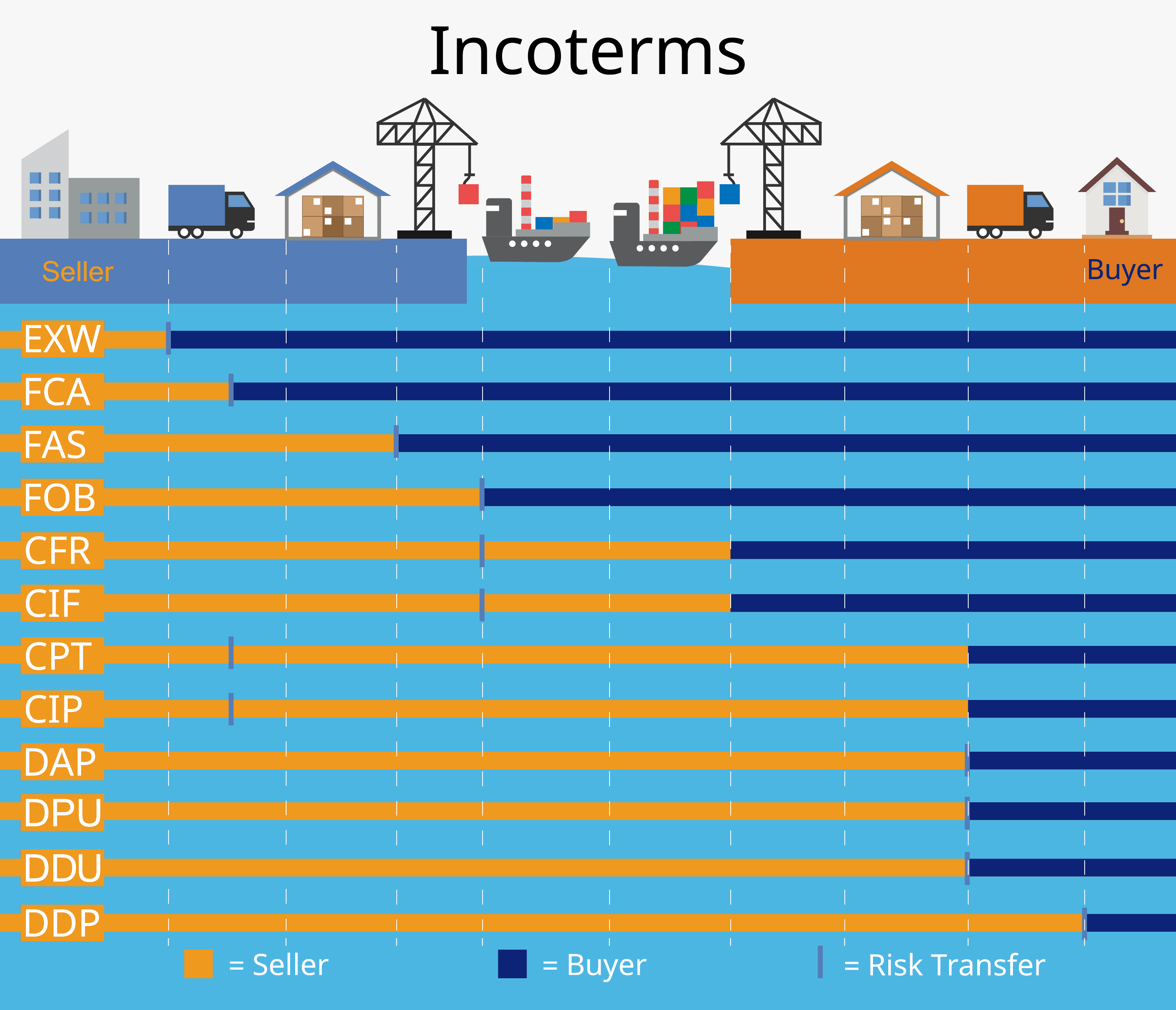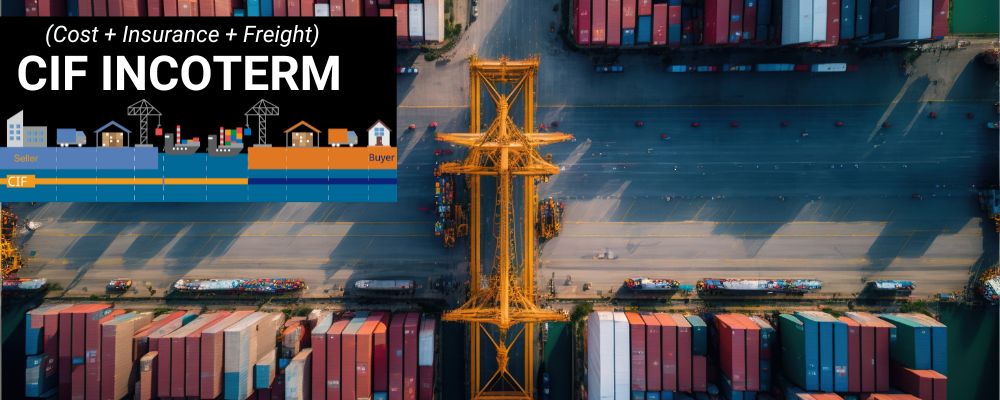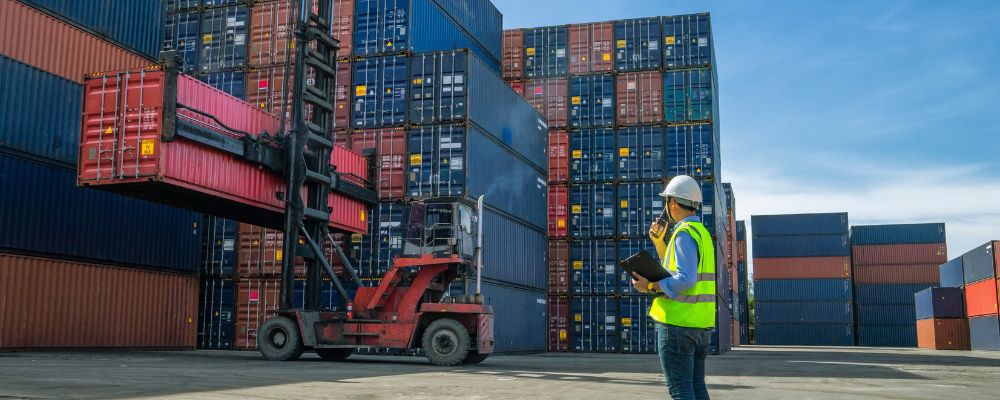Understanding CIF Incoterm: A Comprehensive Guide for International Trade
Welcome to our comprehensive guide on CIF Incoterm – your ultimate resource for understanding the ins and outs of this essential term in international trade. Whether you’re a seasoned importer or exporter, or just starting out in the global market, grasping CIF is crucial to ensuring successful transactions and avoiding costly mistakes. In this blog post, we’ll demystify CIF by unraveling its meaning, outlining its key responsibilities, and equipping you with practical tips to optimize your business operations. So tighten your seatbelts as we embark on a journey into the world of CIF – get ready to unlock new opportunities and take your international trade game to soaring heights!
Introduction to CIF Incoterm
CIF (Cost, Insurance and Freight) is one of the most commonly used Incoterms in international trade. It is a type of delivery term that defines the responsibilities and obligations of both the buyer and seller in a transaction. CIF terms are used for sea or inland waterway transport and are applicable to both maritime and multimodal transport.
CIF requires the seller to arrange transportation, pay for insurance, and handle all necessary export paperwork up until the point where the goods have been loaded onto a vessel at the port of departure. From there, the risk transfers from the seller to the buyer.
In essence, CIF terms mean that the seller is responsible for delivering the goods to a specified destination port agreed upon by both parties. The cost includes all expenses incurred during transportation from origin to destination, as well as any additional fees such as freight charges, insurance costs, customs clearance fees, etc.
Understanding CIF Incoterm is essential for businesses engaged in international trade as it determines who bears responsibility for various aspects of shipping and can greatly impact overall costs. Let us dive deeper into this Incoterm to gain a better understanding of its key features.
CIF Incoterm, which stands for Cost, Insurance and Freight, is one of the most commonly used terms in international trade. It is a widely recognized commercial term that defines the responsibilities and obligations between a buyer and seller when it comes to the delivery of goods. CIF Incoterm specifies who is responsible for bearing transportation costs, insurance costs, and other necessary charges related to the delivery of goods.
This term was first introduced by the International Chamber of Commerce (ICC) in 1936 and has been revised multiple times since then. The latest version can be found in ICC’s Incoterms 2020 rules. CIF is often used in contracts for bulk commodities such as oil, coal, grains or iron ore where the cost of freight may be relatively low compared to the overall value of the goods being traded.
Under CIF Incoterm, the seller agrees to take responsibility for delivering goods from their premises or another specified location at origin to a named port of destination. The seller must also arrange transportation and pay for all associated costs until the goods are loaded onto a vessel at the port of shipment.
When is CIF Incoterm Used?
CIF (Cost, Insurance and Freight) is one of the most commonly used Incoterms in international trade, particularly for maritime transportation. It is often preferred by buyers as it places a higher responsibility on the seller to ensure that the goods are delivered safely to the agreed destination. In this section, we will discuss when CIF Incoterm is typically used and its key features.
CIF Incoterm is primarily used when the buyer wants to receive the goods at their port of destination without having to arrange for transportation. This term is commonly used for bulk shipments of commodities such as oil, coal, grains, and other raw materials.
Moreover, CIF Incoterm is also suitable for situations where the buyer has limited knowledge or experience in dealing with complicated import procedures. By choosing this term, the buyer can rely on the seller’s expertise in handling customs clearance and other formalities related to exporting goods.
Additionally, CIF Incoterm may be utilized when there is no specific agreement between parties regarding freight insurance coverage. Under this term, it is mandatory for sellers to obtain insurance coverage against potential loss or damage during transit.
Advantages of Using CIF Incoterm
CIF Incoterm, also known as Cost, Insurance and Freight, is one of the most commonly used terms in international trade. It is a shipping agreement between the buyer and seller that outlines the responsibilities and costs associated with transporting goods from one country to another. CIF Incoterm comes with many advantages for both parties involved in the trade transaction. In this section, we will discuss these advantages in detail.
1. Simplifies Shipping Process: One of the primary advantages of using CIF Incoterm is that it simplifies the shipping process for both the buyer and seller. Under this term, the seller takes responsibility for arranging and paying for transportation of goods to the agreed-upon destination port. This eliminates any confusion or misunderstandings about who is responsible for which part of the shipping process.
2. Lower Risk for Buyer: The buyer benefits from lower risk when using CIF Incoterm as they do not have to bear any transportation costs until the goods reach their destination port. The seller takes care of all transportation arrangements and insurance coverage during transit, providing peace of mind to buyers who may be unfamiliar with international shipping processes.
3. Reduced Costs: Another significant advantage of using CIF Incoterm is reduced costs for both parties involved in the trade transaction. Since it is the seller’s responsibility to arrange transportation and insurance coverage under this term, buyers do not have to worry about additional expenses such as freight charges or insurance premiums.
Important Factors to Consider when using CIF Incoterm
When using CIF Incoterm in international trade, there are several important factors that need to be considered to ensure a smooth and successful transaction between the buyer and seller. These factors can have a significant impact on the overall cost, risks, and responsibilities involved in the shipment of goods.
1. Cost allocation: One of the primary considerations when using CIF Incoterm is how the costs will be allocated between the buyer and seller. CIF (Cost, Insurance, Freight) means that the seller is responsible for all transportation costs up to the port of destination, as well as insurance for the goods during transit. However, it is essential to clarify which party will bear any additional charges such as terminal handling fees or import duties.
2. Insurance coverage: As mentioned above, CIF Incoterm includes insurance coverage for goods during transit. It is crucial to understand what type of insurance coverage is included in this term and whether it provides adequate protection for your specific shipment. If not, you may need to negotiate with the seller or purchase additional insurance separately.
3. Mode of transport: Another crucial factor to consider when using CIF Incoterm is the mode of transport used for shipping goods. This term only applies to shipments made by sea or inland waterway transport; therefore, if another mode of transportation such as air or land is involved in delivering goods to their final destination, an alternative incoterm should be used.
Comparison with other Incoterms: FOB and DDP
When it comes to international trade, there are various terms and agreements that need to be understood by both the buyer and the seller. One such term is CIF Incoterm, which stands for “Cost, Insurance, and Freight.” It is a commonly used trading term that outlines the responsibilities of both parties in an international shipment.
However, it is essential to understand how CIF Incoterm differs from other commonly used terms such as FOB (Free on Board) and DDP (Delivered Duty Paid). In this section, we will compare CIF with these two popular Incoterms and highlight their key differences.
1. FOB (Free on Board): FOB is one of the most widely used Incoterms in global trade. Under this agreement, the seller’s responsibility ends once the goods are loaded onto a vessel at the port of origin. From that point on, all costs and risks associated with transportation fall on the buyer.
In contrast, under CIF Incoterm, the seller’s responsibility extends beyond just loading goods onto a vessel. They are also responsible for arranging and paying for transport to the agreed destination port as well as insurance coverage during transit.
2. DDP (Delivered Duty Paid): DDP is another popular Incoterm that places almost all responsibilities on the seller. Under this agreement, not only does the seller arrange for transport to deliver goods to the buyer’s specified location but also takes care of customs clearance and pays any applicable duties or taxes.
Conclusion: Is CIF Incoterm right for your business?
After understanding the key elements and considerations of CIF Incoterm, you may be wondering if this trade term is the right choice for your business. The decision ultimately depends on various factors such as the nature of your product, your business capabilities, and your risk tolerance.
Firstly, it is important to consider the type of goods being traded. As mentioned earlier, CIF Incoterm is commonly used for bulk commodities or standardized goods with low value-to-weight ratio. This means that if your business deals with high-value or fragile goods, using CIF may not be the most suitable option as it does not provide enough control and protection over the shipment.
Secondly, you should assess your company’s capabilities in terms of logistics and risk management. CIF requires the seller to arrange for transportation and insurance until the goods reach their final destination. If you do not have experience in these areas or do not have reliable partners to handle them, using CIF may pose a higher risk for your business.
Furthermore, you should also consider your risk tolerance level when deciding on using CIF Incoterm. As mentioned previously, under this trade term, the seller is responsible for any loss or damage during transit until delivery at destination port.
However, once the goods are loaded onto the vessel at origin port, the buyer assumes all risks associated with transportation.











